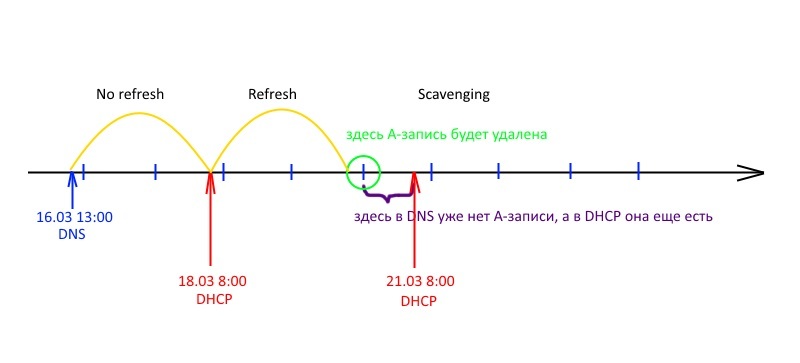Answer the question
In order to leave comments, you need to log in
How to correctly set up a din. DNS updates?
Please help me understand dynamic DNS updates in Windows Server 2012. I have read descriptions of these technologies, but their practical application baffles me.
I'll try to explain clearly what my question is.
So,
1) network with AD, DNS dynamic secure updates enabled, "DHCP name protection" enabled, "delete A and PTR records when deleting a lease".
2) There is a tick in the item "update only at the request of the client".
3) Scavenging on the DNS server removes obsolete resource records every day.
4) The blocking interval (no-refresh) is set to 2 days, the refresh interval (refresh) is 2 days.
5) IP address lease in DHCP is set to 3 days.
Yesterday I posted the so-called. DHCP Credentials, i.e. started a regular account with a non-removable password and gave DHCP her data so that he would update DNS records on her behalf.
Problem:
Today (18.03 at 8:00) I see that DHCP has issued (or extended) an IP address lease until 21:03 8:00. At the same time, in the DNS, the corresponding A-record has the timestamp "3/16 13:00".
Question:
1) who registered this entry two days ago? The client himself?
2) will it not turn out that there will be no record in DNS, and in DHCP the address will still be listed behind this computer?
3) how is it generally better to set these intervals, leasing, etc.? Can you advise specific numbers to avoid such discrepancies and avoid duplicate IP addresses in DNS?
I drew a picture for clarity. The blue marks on the timeline are the DNS cleanup intervals. Thank you.
Update:
Another problem:
an address of the RAS type has appeared in the DHCP server (its lease expires in three days). The IP address of this computer is different from the one specified in the DNS (there is a timestamp of 18.03 8:00). The computer responds to the address specified in DNS.
Previously, there were no RAS.
Answer the question
In order to leave comments, you need to log in
Didn't find what you were looking for?
Ask your questionAsk a Question
731 491 924 answers to any question